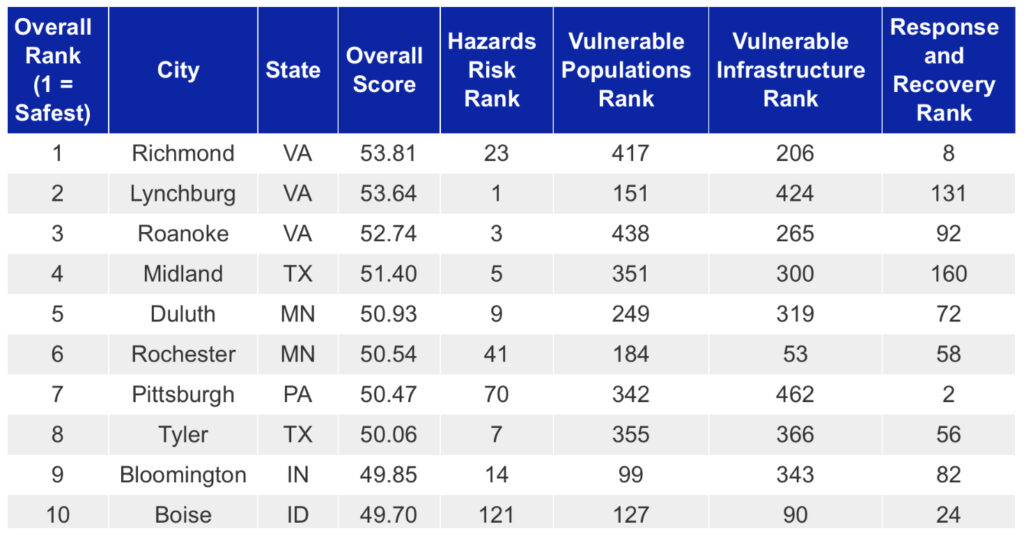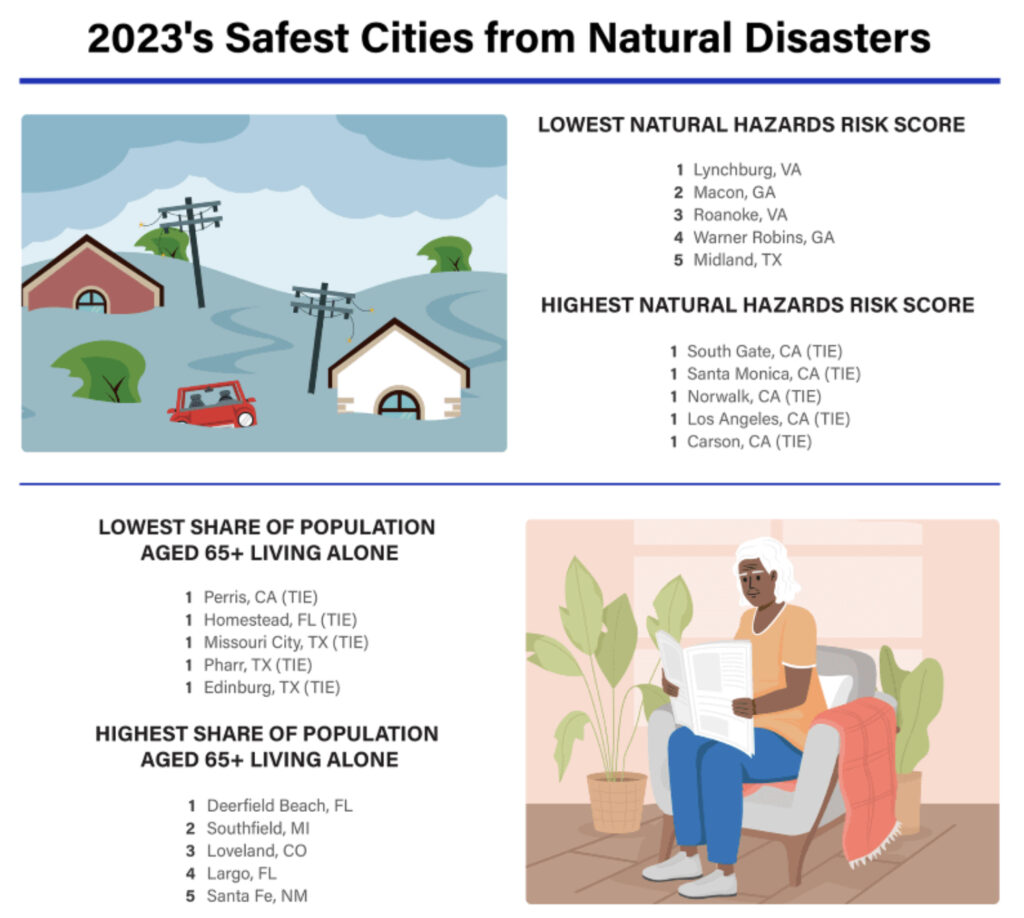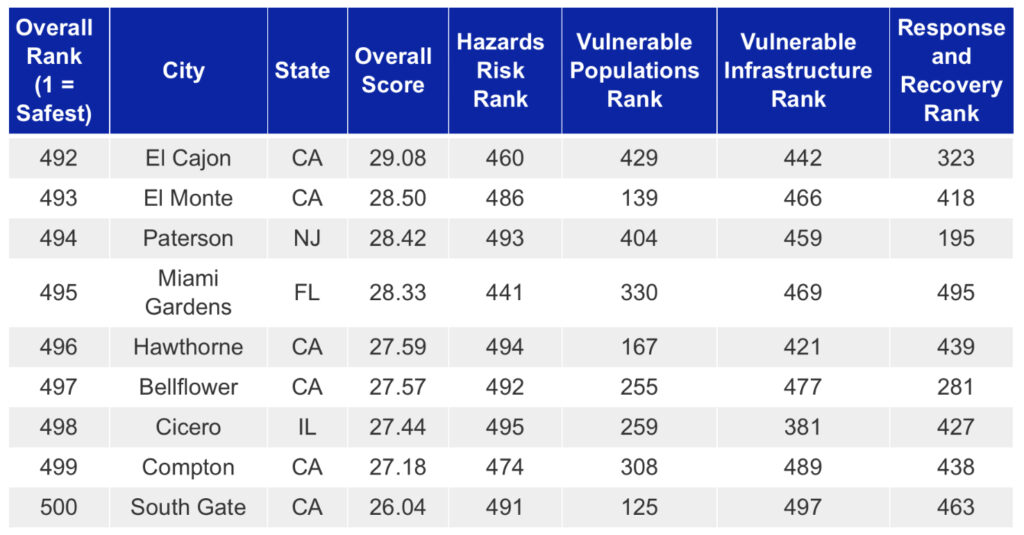It’s 2023, and while a century ago the population thought we’d have flying cars and life would be peaceful, Mother Nature has decided otherwise since we apparently can’t take really good care of her. Natural disasters are evermore present in our lives, from fires in Canada and Hawaii to hurricanes and tsunamis destroying homes and lives. If you live in the United States, you may be wondering where you and your family would be safest to continue walking this earth. Well, thanks to Gutter Gnome, we have the answers for you.
2023’s Safest Cities from Natural Disasters
To kick off September as National Preparedness Month, Gutter Gnome has just unveiled the list of the safest cities in 2023 when it comes to dodging natural disasters. They took a deep dive into the 500 largest cities in the U.S., checking them out in five different areas: the risk of hazards, the well-being of vulnerable communities, the strength of their infrastructure, how they handle response and recovery, and the ease of mobility. These natural disasters encompass everything from wildfires, earthquakes, and tornadoes to hurricanes and floods, a grand total of 18 disasters straight from FEMA’s National Risk Index FEMA’s National Risk Index.

If you live in Richmond, VA, you’ll be happy to know that you won’t need to sell your house or tell your landlord that it’s over between you both because you’re as safe as can be from any natural disasters. Or so gutter Gnome says. With an overall score of 53.81, it ranks number 1 and wins the Safest City to live in award. The award being that you can be much less stressed living in this city. Here are some reasons why Richmond has ranked so well:
Geographic Location
Richmond is inland and not located on the coast, which reduces its susceptibility to hurricanes and storm surges. It’s also outside of major earthquake zones, which further minimizes seismic risks.
Moderate Climate
While Richmond does experience some extreme weather conditions, it generally has a moderate climate with fewer instances of extreme heatwaves or bitter cold, reducing the likelihood of weather-related disasters.
Low Tornado Risk
While tornadoes can occur in Virginia, they are less frequent in Richmond compared to areas farther west and south in the state.
Preparedness and Infrastructure
Richmond has invested in disaster preparedness and infrastructure, including flood control measures and emergency response systems, to mitigate the impact of potential disasters.
Effective Emergency Services
Richmond has well-established emergency services and coordination with state and federal agencies, ensuring a swift response in the event of a disaster.
It’s important to note that while Richmond may be safer from certain types of natural disasters compared to other regions, no place is entirely immune to the possibility of natural disasters. Residents should still remain vigilant, stay informed, and be prepared for potential emergencies.
While Richmond doesn’t appear in some of the graphics displayed on Gutter Gnome, here are some other cities that ranked well on the Natural Disaster Safe Zones scale. And those who didn’t.

Their ranking revealed something quite intriguing: None of the top-ranked cities were outstanding in every aspect. Each one had its own mix of strengths and weaknesses, showcasing how disaster preparedness is a complex, multifaceted endeavor. However, if we look at the top 25 cities, most of them enjoy relatively low exposure to hazards, with the exception of Boise, Idaho (ranked 10th), Murfreesboro, Tennessee (ranked 16th), and Austin (ranked 20th). These three cities compensate for their higher Hazards Risk with robust Response and Recovery and Mobility measures.

Now, on the flip side, the bottom 25 cities, primarily located in California, are dealing with a tough reality: they face a high risk of hazards, particularly wildfires and earthquakes, alongside a range of other vulnerabilities. It’s worth noting that a handful of cities in this group are making commendable efforts to enhance safety. However, for the majority of the cities at the bottom of the list, it seems they are struggling to tackle the challenges presented by natural disasters.
If you wish to see every ranking available, head on over to Gutter Gnome and find out if you need to mark “Move Somewhere Else” on your calendar.
Gutter Gnome also takes a deep dive into some interesting data you might want to share with your family who live in different states than you. You’ll also learn how to be better prepared in case of emergency.
Want to chat about all things post-apocalyptic? Join our Discord server here. You can also follow us by email here, on Facebook, or Twitter.

